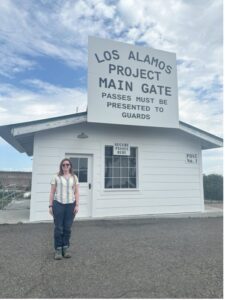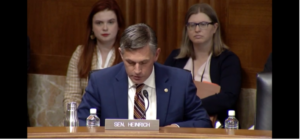October 15, 2024
A year in the life of a Congressional Science Fellow
Posted by Caitlin Bergstrom
Devon Gorby, PhD, was AGU’s 2023-2024 Congressional Science Fellow. She is now a AAAS Science and Technology Policy Fellow at the U.S. Department of State.
From September 2023 to September 2024, I worked in the office of Senator Martin Heinrich of New Mexico as AGU’s Congressional Science Fellow. I used my scientific background in climate science, geology and hydrology to cover his water and environment portfolios. The experience was the best of my career so far, and I encourage everyone with an interest in using their expertise to inform policy to apply to a Congressional Science Fellowship.
As a graduate student during the COVID-19 pandemic, I found myself very frustrated in the gap between science and policy. It motivated me to pursue several science policy training opportunities, including AGU’s Voices for Science Program. Through these experiences, I realized that my skills best suited me for a career in science policy or science communication. The AGU Congressional Science Fellowship was the perfect opportunity for me to make this career switch. But no fellow’s journey is the same: many of my colleagues viewed the fellowship as an opportunity to bring new perspective back to their home institutions.
At the beginning of my fellowship, I interviewed with over a dozen offices in the House and Senate. I was excited to work with Senator Heinrich because he takes a very bipartisan approach to policymaking. As a climate scientist, I saw the issue as intensely partisan, and I was curious to learn more about how climate and environmental policy is passed in such a divided Congress. While there is still a long way to go to bridge the gap between climate science and climate policy, I learned that there is more bipartisan common ground than the headlines suggest. I was able to support several pieces of bipartisan legislation- including the Water Resources Development Act and the National Defense Authorization Act- as they inched their way through Congress. These two bills are considered “must-pass” legislation that need to head to the President’s desk before the end of the year.
There is no typical workday on the Hill, but I often found myself meeting with constituents or staffers from other offices, writing letters or memos, or preparing materials to staff Senator Heinrich in meetings or committee hearings. During my year in office, I was able to help with several pieces of legislation. I worked on five Tribal Water Settlement bills and helped them advance through committee hearing and markup. I introduced a bipartisan bill to extend the “Every Kid Outdoors” program, which provides fourth graders and their families with free access to National Parks and other federal public lands. I also gained a deep understanding of the federal budget process during the FY24 budget cycle, as Senator Heinrich is a member of the Appropriations committee. Appropriations often felt like “Type II Fun”- miserable in the moment but fun in hindsight- and I am proud of the Congressionally Directed Spending (also known as earmarks) that I helped secure in the Senate version of the bills.
I had the opportunity to visit New Mexico for a week, made possible by the professional development funds included with AGU’s Congressional Science Fellowship. During my time in the state, I staffed Senator Heinrich during a state work period, which was jam-packed with meetings, media requests, and public events. I met with some of the constituents I worked with during my fellowship, as well as the Senator’s staff in New Mexico. It was an incredible opportunity to inspire new policy ideas and build relationships with people I’d previously only met in virtual meetings.
When I began my fellowship, I joked to my mentor that my goal for the year was to remain an optimist. In some ways, I am more optimistic about our future now than I was at the outset. I’ve seen first-hand the difference that sustained, active constituent outreach can have on a Member of Congress’s policy position. But there are some real challenges ahead. With the Supreme Court’s decision to overturn the Chevron doctrine, which gave federal agencies latitude to interpret the laws that they administer, the lack of scientific expertise to inform policy on the Hill is more glaring than ever. Future Congressional Fellows will have an important role to ensure that legislation is rooted in the best-available science and properly gives authority to the appropriate federal agencies.
If this challenge appeals to you, you can learn more about AGU’s Congressional Science Program on their website, and apply to be a fellow. Applications for the 2025-2026 cohort are open now until 15 January 2025.











